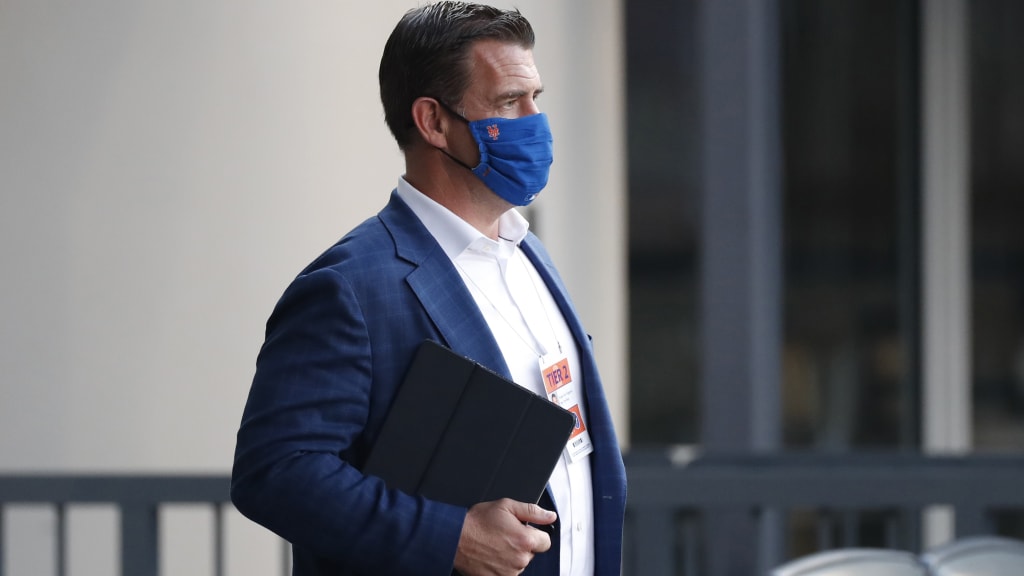
NEW YORK -- Speaking a week before Monday's Trade Deadline, Mets general manager Brodie Van Wagenen indicated a preference to be conservative. Given the uncertainty surrounding every team in 2020, and specifically the Mets after a player and a staff member tested positive for COVID-19, Van Wagenen predicted a quiet week.
With one caveat, of course: As long as Van Wagenen -- one of the most aggressive GMs in baseball -- is in charge, there’s always a chance the Mets do something unexpected.
“The aggressive approach that we’ve taken in the past is not something that we will eliminate from a possibility,” Van Wagenen said. “But we recognize we’ve got a 30-game season effectively, and less than that once the Trade Deadline comes and goes, and so we have to be responsible for the future of the organization while still being opportunistic for ways to improve the club.”
Whether that means an addition to the Mets’ rotation mix or some other acquisition remains to be seen. For now, the Mets will canvass the market in hopes of spurring the same type of late-season rally that nearly propelled them to a playoff spot in 2019.
An important wrinkle to this year’s Trade Deadline is that teams can only deal players who are part of their 60-man player pool (assigned either to the big league team or the alternate training site). Clubs are permitted to include players to be named later in trades, however. Additionally, scouts have not been allowed to attend games in person, so all assessments of prospects have been done based on provided video and data to supplement past knowledge.
Buy/sell/hold: If the Mets do anything at the Deadline, they will buy. Despite spending most of August outside the National League’s playoff picture, the Mets, like most teams, stayed close enough that a late run is realistic. Van Wagenen specifically mentioned both rental players and longer-terms additions as possibilities, while acknowledging that the latter would cost more -- perhaps prohibitively so.
“I wouldn’t see a rental player, for us or anybody else, commanding a huge return in terms of prospects,” Van Wagenen said. “I think teams will be more conservative overall.”
What they want: Rotation help would be a boon for the Mets, who lost Noah Syndergaard to Tommy John surgery and Marcus Stroman to his decision not to play over COVID-19 concerns. Injuries to Michael Wacha and David Peterson further depleted the Mets’ pitching stores, while poor performances from Steven Matz and Rick Porcello weakened the team’s confidence in its ability to fix rotation flaws from within.
The impending returns of Wacha and Peterson, however, could dissuade the Mets from making a splashy move at the Deadline. Van Wagenen even repeated a frequent chorus of former Mets GMs in comparing the returns of injured players to big Deadline acquisitions.
“When we think about our needs, being able to get some more depth and more talent in the rotation … we have those guys just on the IL right now,” Van Wagenen said.
What they have to offer: This, again, depends upon how aggressive Van Wagenen plans to be. Earlier this month, the Mets shifted three of their Top 10 prospects -- shortstop Ronny Mauricio, catcher Francisco Alvarez and pitcher Matthew Allan -- into their 60-man player pool, thereby making them eligible for trades. But the Mets have shown no indications that they plan on moving those players, and Van Wagenen indicated that he doesn’t intend to make deals of that magnitude.
The fact that Mets owners Fred and Jeff Wilpon are in the process of selling a majority stake in the team may also affect their plans at the Deadline.
If the Mets have an area of depth to draw from, it is in the middle infield, considering Amed Rosario, Andrés Giménez and Mauricio could all make clams to being the team’s shortstop of the future.
Chance of a deal: Call it 75 percent. Van Wagenen isn’t the type to sit on the sidelines, but he appears unenthused about the idea of springing a blockbuster. Most likely, the Mets will complete a smaller deal to improve at the margins, such as the one they made in acquiring outfielder Billy Hamilton earlier this year.


